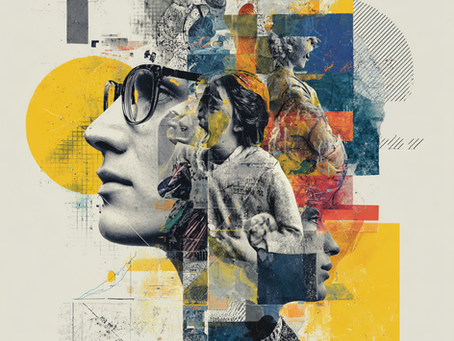top of page

Welcome to the Blog!


It’s Not Arrogance. It’s Safety. (The Neuroscience of the "Hypercritical" Partner)
When your partner constantly corrects you, it can feel arrogant, demeaning, and emotionally exhausting. But in many neurodiverse relationships, this behavior isn’t about control—it’s about safety. Understanding the neuroscience behind the “hypercritical” partner can transform blame into clarity and help couples repair what chronic correction erodes.
2 days ago5 min read


You Check Your Teeth. Why Not Your Relationship? The Case for a Neurodiverse Relationship Check-Up.
We do routine maintenance on everything that matters—our cars, our teeth, our bodies. But most couples wait until their relationship is breaking down before asking for help. In neurodiverse partnerships, this delay leads to burnout, loneliness, and mutual masking. A neurodiverse relationship check-up offers a smarter, preventative way to understand your wiring before crisis hits.
2 days ago5 min read


The Supply Drop: How to Feed a Hyperfocused Partner Without Breaking Their Brain
Have you ever walked into a room to ask your partner a simple question—like “Do you want lunch?”—and been met with silence, irritation, or a look that says you’ve committed a crime? You’re not dealing with rudeness. You’re dealing with hyperfocus. When a neurodivergent brain locks into deep focus, interruptions can feel physically painful. This post introduces The Supply Drop—a way to support a hyperfocused partner’s body without breaking their brain or damaging your connecti
Jan 216 min read


Beyond the "Spectrum": New Science Reveals 4 Distinct Types of Autism
Finally, a biological answer to "Why now?" New research identifies 4 types of autism based on genetic timelines. Discover the four phenotypes—Social/Behavioral, Moderate Challenges, Mixed, and Broadly Affected—and how this shift beyond the "spectrum" changes everything for neurodiverse couples.
Dec 29, 20254 min read


Holiday Survival Guide for Neurodiverse Couples
Holidays amplify everything—warmth, noise, expectations. For neurodiverse couples, this can mean sensory overload, misread signals, or conflict that wasn’t meant to happen. This guide offers simple, repeatable tools: pause cues, sensory planning, repair scripts, monologue cues, and ND-friendly communication strategies to help you stay connected, regulated, and on the same team this holiday season.
Nov 30, 20253 min read


When Focus Becomes a Fight in Neurodiverse Relationships
Hyperfixation, special interests, and Monotropism can look the same from the outside — but inside, they feel completely different. This guide breaks down each pattern, explains how ND attention works, and offers simple steps for partners to stay connected without shame, overwhelm, or resentment.
Nov 29, 20254 min read


Breathe Together, Calm Together: A 2-Minute Reset for Neurodiverse Couples - (Autism friendly stress relief)
Overload isn’t rudeness—it’s your body going offline. Breath is the fastest reset. Learn autism-friendly ways to use the physiological sigh or resonance breathing to calm your system, regulate with your partner, and prevent spirals. Two minutes daily can change everything.
Sep 23, 20253 min read


Why Neurodiverse Couples Can Thrive (Backed by Science)
Miscommunication doesn’t mean autistic–neurotypical relationships are doomed. Research shows that relationship satisfaction depends on responsiveness, not sameness. Learn how the double empathy problem impacts couples—and how therapy can help you build clarity, connection, and lasting love
Sep 11, 20252 min read


Tired of your Inner Critic?
Some of the most damaging lies are the stories you tell yourself: “I’m too awkward to make friends,” “I’ll never get it right.” These thoughts feel true because they’re familiar—not because they’re facts. Research shows people like you more than you think, notice your mistakes far less, and often see your openness as courage. By catching and reframing these old stories, you can start living the story you truly want.
Aug 26, 20253 min read


PDA: When “No” Is a Survival Reflex - Pathological Demand Avoidance
Pathological Demand Avoidance (PDA), or Persistent Drive for Autonomy, isn’t defiance—it’s a nervous system response to pressure. Learn the signs, what triggers it, and how to create safety and connection at home or in relationships.
Aug 15, 20253 min read


Less Labeling. More Understanding. - autistic traits in relationships
Wondering if your partner might be autistic? Skip the pressure of a diagnosis. Use our relationship-focused trait screeners to gain clarity, understanding, and connection.
Aug 13, 20252 min read


A Message from Jenny Pan, Neurodivergent Asian Therapist | Autism and ADHD in Asian communities
Jenny Pan, a Chinese American therapist and neurodivergent advocate, shares her story of navigating two cultures, masking, and reclaiming her voice. If you're Asian and neurodivergent, you don’t have to choose between honoring your culture and honoring your needs. You can heal—and be fully seen.
Jul 30, 20252 min read


⏸️ Hit Pause, Save Love: How to Stop arguments from Escalating.
When your next argument starts to spiral, don’t power through—pause. A simple homemade card can short-circuit meltdowns, misfires, and misunderstandings. Here’s how to use it.
Jul 20, 20252 min read


Is It Just a Teen Meltdown—Or Is It Autism No One Caught?
Is your teen struggling after school but “fine” at school? Autism in teens—especially girls and high-masking kids—often goes undetected. Learn how self-understanding, not just diagnosis, can help your teen thrive.
Jul 17, 20252 min read


The BIG 10 for Neurodiverse Relationships
You’ve seen top 10 lists before. You might roll your eyes. Too generic. Too fluffy. Doesn’t apply. We get it. But this one’s different. It’s built for your relationship. A neurodiverse relationship.
Jul 10, 20252 min read


What 650 Responses Reveal About Masking in ND Couples
Most therapists guess about behaviors. We ran the numbers. We analyzed data from 650 people. They all took the CAT-Q (Camouflaging Autistic Traits Questionnaire). We looked at every score. No guesswork. Just patterns. The CAT-Q measures how much someone hides autistic traits.100 or more means a person is camouflaging. The average score was 128! That’s a ton of effort.
Jun 26, 20252 min read


HSP? ADHD? Autism? Stop Guessing—Start Exploring
HSP, Autism, or ADHD? Figuring Out What Fits You—Without the Labels Taking Over
Let me know if you want variations for different audiences (e.g., partner-focused, clinical, or youth-oriented), or if you’d like social sharing text too!
Jun 9, 20252 min read


Autism and Sex: Finally, a Way to Understand the Disconnect
Autism and Sex: Finally, a Way to Understand the Disconnect. But if you’re autistic—or in a relationship with someone who is—Bedroom rules can feel more like a test you didn’t study for.
“Tease each other?” What does that actually mean? “Keep a steady pace?” Based on whose rhythm?“Don’t be afraid to experiment?” What if new things feel overwhelming?
For many autistic adults, these kinds of open-ended instructions feel confusing, stressful, or even shame-inducing.
May 29, 20252 min read


Blended Family Meets Neurodiversity: Bonus Parents, Big Feelings, and Brain Differences
The divorce is in the rear mirror. You found love again. You brought two households together. You imagined a bigger table…more laughter…shared adventures. Then reality pulled up a chair. Suddenly, everything feels like a tug of war.
May 19, 20253 min read


📈Autism in Adults Up 450% — Good News or Bad?
At first glance, it sounds alarming. A 450% increase in autism diagnoses among adults aged 26 to 34. Back in 2011, only about 91,000 adults in that age group had received a diagnosis. In 2022, that number was closer to 500,000.* So what’s going on?Are more people becoming autistic? Or are more people finally being seen?
May 9, 20252 min read
bottom of page